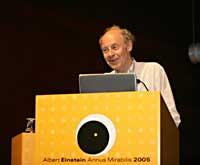Beyond the knowledge of Einsten
2005/09/07 Kortabitarte Egiguren, Irati - Elhuyar Zientzia

After the official opening on Monday afternoon, Alberto Galindo, Rafael Rebolo López, Amand A. Tuesday morning was the turn of speakers Lucas and Fernando Flores.
The afternoon began with a talk outside the program. Physicist Heinrich Rohrer followed him. And then the French chemist Jean-Marie Lehn spoke. He gave a wonderful talk about the steps to be taken to build a complex (organized) matter, among which he highlighted the importance of chemistry in this work. He insisted on the example of the key and the lock, that is, that each key has its own lock, so you have to build the key according to the lock. Something similar also happens in science.
At eight o'clock, Professor Jesús Ugalde gave a short presentation of the last speaker of the day, Dudley Herschbach. He described as a very humorous person the American winner of the Nobel Prize in Chemistry in 1986. He once appeared on the TV show Simpson and even projected these images among the laughter algae of many of the congress attendees. Without further extension, he spoke to the American scientist.
"Seeing many young people is what surprises me most and fascinates me at this congress," Herschbach said. He also made a small reflection on Einsten's image and work. And he said most of us don't do science according to Einsten's image.
For those attending Congress he gave the following message: "There is much more to look for." And live he began to explain the Brownian movement and molecular motors. Somehow, he tried to unite both. In fact, molecular motors, especially enzymes, face Brownian movement.
Grandmaster Einstein also mentioned the four articles on the Brownian movement. However, in Brown, Jean Perrin, Adam E. He also showed the works and articles of Cohen, etc.
But, to finish, he returned to his initial message and ended his speech with the following sentence: "Science has to do with what we don't know."



